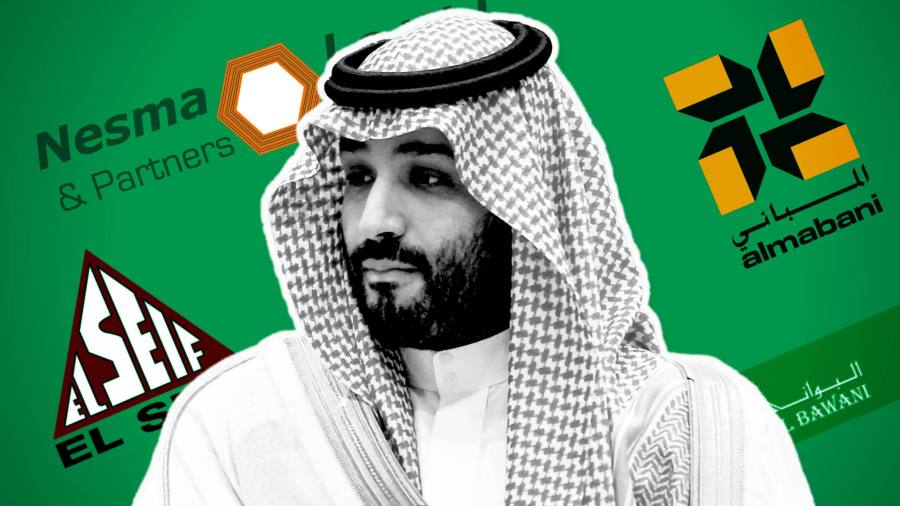As Saudi Arabia enjoyed an unprecedented oil boom in the 1970s, the monarchy turned to a handful of merchant family companies to build the nation’s infrastructure.
But almost 50 years and another oil windfall later, many have been sidelined by a rising cadre of businesses that have one thing in common: the state Public Investment Fund has taken a stake in each.
The growing dominance of the $650bn sovereign wealth fund, chaired by Crown Prince Mohammed bin Salman, underscores the extent to which the country’s day-to-day ruler has upended the old order as he robustly asserts his control over the economy and seeks to diversify it away from oil revenues.
“There’s definitely a change in the guard,” said Monica Malik, chief economist at the Abu Dhabi Commercial Bank and author of a book on the Saudi private sector. “Development is being driven by government-led entities, it’s very much more a centralised and public sector-led growth.”
In February, the sovereign wealth fund announced it was investing $1.3bn in four companies that have risen to prominence in recent years: Nesma & Partners Contracting Company, El Seif Engineering Contracting Company, Albawani Holding Company and Almabani General Contractors.
They have all been around for decades, but have come to the forefront as rivals that once secured the biggest contracts lost Riyadh’s support. El Seif was founded by the Riyadh-born Khaled El Seif in 1975. Abdul Moeen Al Shawaf, also from the capital, founded Albawani in 1991. Almabani was founded in 1972 in Jeddah by the late Saudi businessman Kamal Adham.
Several of those formerly favoured, such as Saudi Binladin Group, were forced to hand over $100bn worth of what the government described as ill-gotten assets, after an anti-corruption drive was launched less than a year after Prince Mohammed’s 2017 appointment as crown prince. About 300 businessmen, princes, and bureaucrats were detained in the Saudi capital’s Ritz-Carlton Hotel as part of the anti-graft campaign, sending shockwaves through the business community.
Saudi Binladin came under the control of a government-appointed committee, with an almost 40 per cent stake transferred to a state-owned company.
Officials from the PIF argue that some companies had grown accustomed to receiving government contracts and subsidies and so were reluctant to take risks or innovate. This meant the private sector could not be relied upon to steer the country’s economic transformation alone.
“There’s an idea among [Prince Mohammed] and some of his advisers that the old merchant class were leeches, unproductive rent seekers, and they want to rear a new business class,” said Steffen Hertog, a Gulf expert and associate professor in comparative politics at London School of Economics.
Some businesses never recovered from the anti-graft drive, while others have since kept a low profile. A regional banker said: “It’s not just that they lost out — they lost confidence and disappeared. They were marginalised. Their bank accounts were monitored.”
“I still see [the business owners] . . . they’re critical of what’s happening,” the banker said.
The ostensible anti-corruption purge was popular among many Saudis, but came amid a wider crackdown on dissent. Observers saw it as a statement by the crown prince, who had sidelined opponents within the royal family and their business supporters.
“It was kind of like shooting the Tsar. The Bolsheviks had already won but they made it clear there was no going back,” said David Rundell, a consultant and former US diplomat who served in Saudi Arabia.
However, the emergence of a new cohort of PIF-backed companies has led to accusations that the state has replaced one set of preferred businessmen with another. An official familiar with the fund said the PIF invested in such businesses because they were well-run and experienced.
Nesma was founded in 1979 by Saleh Al-Turki, who stepped down as president and chair in 2018 when he was appointed mayor of Jeddah, the commercial capital, by royal decree. He enjoys good ties with Prince Mohammed, a person familiar with the matter said.
“Before it used to be state socialism, now it’s state capitalism,” said a Saudi analyst who requested anonymity. “There’s a lot of bitterness . . . You’re just giving all the contracts to the PIF and you created a [new] class of bureaucrats who are young, ambitious and greedy.”
But other analysts say the dynamics are very different now, with favoured companies getting smaller margins from contracts than would have been normal in the past. “It’s all PIF-led, but they’re all being offered narrow margins. The PIF is negotiating hard,” said the banker.
Some of the old Jeddah merchant companies, such as Almunajem Foods and retail giant BinDawood, have been able to grow their businesses in recent years. But many others have fared poorly after energy subsidies were curbed as part of Riyadh’s economic reform drive and fees were increased for companies hiring foreign workers.
“Most of those businesses were drugged with the subsidies . . . the cheap energy, the labour, the corruption,” said an executive of a Jeddah-based family company who requested anonymity.
“You need to have relationships when you’re taking any project, but it’s not entirely dependent on that,” the executive said. “In the end, if it’s not adding value economically, I won’t get [a contract] just from my connection. [The government] needs to do a stress test, it needs to know I can deliver.”
“The PIF acquires stakes in companies to create national champions,” said Hertog, of the LSE. “There’s a form of displacement, but I don’t see large-scale rent-seeking. I don’t think that the management of those state-owned firms take huge cuts, I don’t see large-scale corruption.”
Read the full article here




